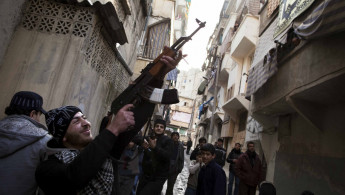Lebanon continues to get tough on celebratory gunfire
Mohammad Ali al-Hajj Hassan and Jamil Ons Machlah were both sentenced on 10 July under new and stricter laws that aim to prevent the deadly practice.
Hassan and Machlah were both prosecuted under a new law, which strengthens an already-existing law, preventing celebratory fire in public places.
The court heard how Hassan fired an unlicensed weapon during a wedding in the Bekaa town of Temnin al-Tahta in the Bekaa on 6 July, while Machlah shot in the air during a funeral in the Akkar town of Bebnin on 29 June.
On Wednesday, another man was arrested in the Bekaa Valley for firing a rocket propelled grenade to celebrate exam results, according to the Daily Star.
Celebratory gunfire has always been illegal in Lebanon, but the practice remained widespread, despite the dozens of deaths it causes every year.
On Saturday, a seven-year old was killed after celebratory gunfire following the release of exam results.
The number of deaths from celebratory gunfire has started to make headlines in Lebanon, forcing the government to get tough on the tradition. Police made more than 130 arrests connected to the practice between June and July 2016.
Police spokesperson Joseph Mousallem called the practice "a sick, fatal phenomenon".
The previous act - article 75 of the Firearms Act 1959 - stated that "anyone firing weapons in residential areas or in a crowd, whether their gun is licensed or not" faced up to three years in prison or a fine.
This law was rarely enforced however, as the practice happens so frequently, with gunshots regularly heard at weddings, funerals - even at political rallies.
All this changed on 27 October 2016, when the law was updated to increase a potential fine from 500 LBP (60 US cents) to 25 times more than the national minimum wage - currently set at 675,000 LBP ($450) per month - in case of death.
And most importantly, the law does not allow for the substitution of fines for prison sentences - increasing the chance of a custodial sentence.
Anyone found guilty of celebratory gunfire without causing injury faces three months to six years in prison, rising to temporary hard labor and 10 years in jail if an injury occurs.
Manslaughter by celebratory fire now carries a minimum sentence of 10 years, in addition to temporary hard labor and a fine.
There are an estimated four million licenced guns in Lebanon - population four million - according to the NGO, Permanent Peace Movement.





 Follow the Middle East's top stories in English at The New Arab on Google News
Follow the Middle East's top stories in English at The New Arab on Google News
![Netanyahu furiously denounced the ICC [Getty]](/sites/default/files/styles/image_330x185/public/2024-11/GettyImages-2169352575.jpg?h=199d8c1f&itok=-vRiruf5)
![Both Hamas and the Palestinian Authority welcomed the ICC arrest warrants [Getty]](/sites/default/files/styles/image_330x185/public/2024-11/GettyImages-2178351173.jpg?h=199d8c1f&itok=TV858iVg)
